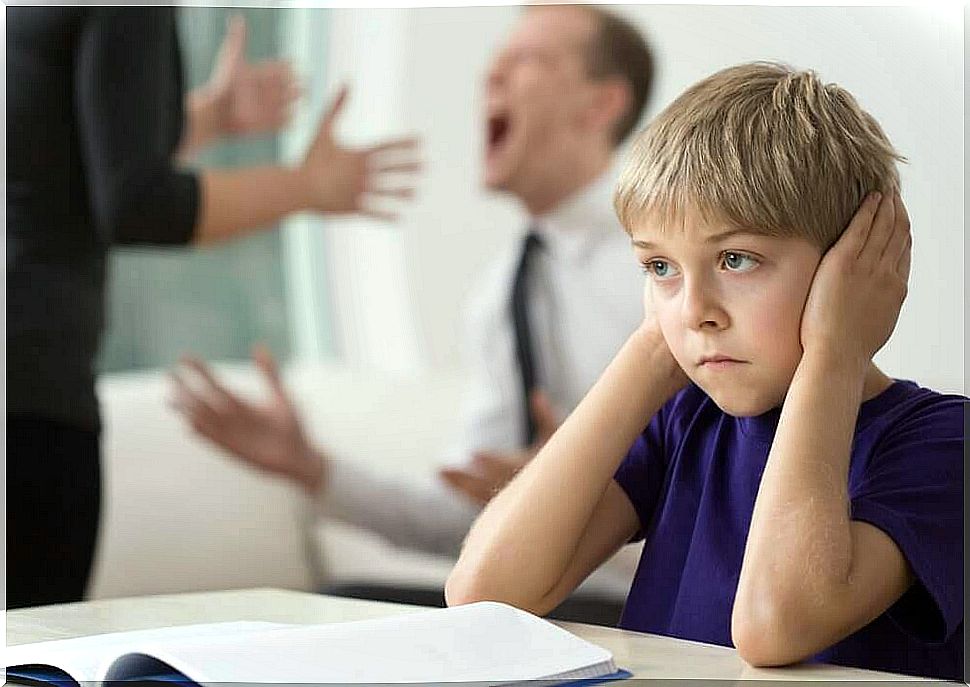5 Effects Of Arguing In Front Of Your Kids

If you read about the effects of arguing in front of your children, you will deal with it differently from now on. No matter how happy and mature your relationship is, there will always be discussions and difficult moments.
However, sometimes you forget that your child is present and that can have serious, negative consequences for their development. That’s why today we want to share with you 5 effects of arguing in front of your kids.
Domestic violence and its effects
According to UNICEF, a family is the most important social institution for the education, training and protection of its members. However, due to poor communication or emotional guidance, quarrels between parents can turn into serious conflicts that hurt not only them but their children as well.
In fact, specialists say that children worldwide are more at risk of violence in their home environment than anywhere else. You might think that your fight is not affecting your children.
However, the truth is that arguments between parents, whether verbal or physical, are part of domestic violence. That is why quarrels at home directly or indirectly affect children. Today we tell you why.
The Effects of Arguing in Front of Your Kids

Several factors can shape family relationships. These factors can include:
- social
- emotional
- behavioral
- structural
These are also altered by physical or emotional violence at home or by the use of power—when some form of intentional or unintentional aggression becomes a common problem-solving tool.
This makes all members of the household think that violence is normal. It affects every aspect of your life and especially your children, who are unable to question, criticize or change their situation.
Although we are only sharing the general effects today, they can affect different aspects of your child’s life and they are very important.
1. Physical Effects
Arguing at home can manifest physically in your child. They can:
- develop more slowly
- suffer from sleeping problems
- developing eating disorders
- develop psychosomatic illnesses
- and so on
2. Emotional Effects
It is important to mention that children have no other healthy frame of reference than their parents. As a result, they may struggle to understand their emotions in a household where arguing is the norm.
It can be difficult for them to control frustration or anger so they express themselves through aggression. This causes violent behavior, both towards others and towards oneself.
They may also feel helpless when faced with this trauma. This can lead them to withdraw from social contacts because they are worried or have become anxious.
3. Social Effects
Another consequence of arguing at home is that your child cannot develop his or her ability to communicate well and form friendships or other close relationships with other people.
This is because they fear experiencing trauma again and they use avoidance behaviors to avoid feeling things they associate with violent memories. They can also:
- Developing a lack of empathy
- becoming detached
- getting aggressive
- Start displaying criminal behavior
4. Cognitive Effects

Children who witness their parents’ quarrels have trouble concentrating. It can also be difficult for children to pay attention, which affects their school performance and development.
It is also possible that they develop dissociative behaviors. This is a defense mechanism by which they try to distance themselves from reality to minimize conflict and stress.
This is considered a disorder because it can change:
- Conscience
- Identity
- Memory
- The perception of what is happening around you
5. Effects on Self-Esteem
Children can develop negative feelings about themselves because they are still developing. They may think they are guilty or responsible for the quarrels. This often results in low self-esteem, depression and anxiety.
Conclusions about arguing in front of your kids

Domestic violence is directly related to hurting, aggressive and insensitive behavior in children when they are young, but possibly also later in life.
If not addressed in a timely manner, this problem can pose a threat not only to the health of the children, but also to society.
As parents, you have to take responsibility for your own actions and deal with them in the best possible way. Even if you have had a difficult life or if your childhood memories of the family you grew up in are difficult due to violence or abuse. This does not mean that you have to pass it on to your own children.
Try to change these toxic patterns and solve your relationship problems in a civilized and loving way. If that proves too difficult, try it with a therapist. Your children’s health and well-being are vital – make sure they are happy.









